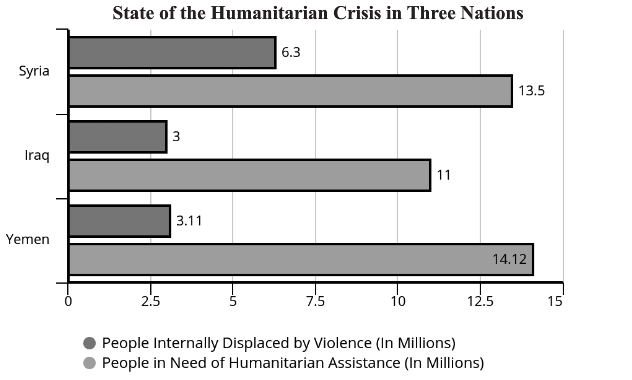Global suffering must cease regardless of nationalism
Information provided by the United Nations OCHA. Infographic by Kate Bennett.
Syria, Iraq, and Yemen have Level 3 emergencies that must be addressed.
March 23, 2017
How fortunate the American people are, for we are afforded rights under the American Constitution that provide this country with the means to strive for progression – morally, legislatively and economically. Through ideologies focused around liberty and equality, Americans have aspired to solidify and maintain well-established living conditions for themselves and their neighbors. And from this thought pattern, individuals tend to develop humanitarian natures, because America does not represent or provide for one individual only.
But Americans cannot lose sight of human populations dispersed across the globe. Recently, the United Nations declared that the world is currently facing its greatest global humanitarian crisis since 1945. We cannot ignore the extreme suffering endured elsewhere in the world; we must find the means to support these countries, since they do not have the necessary resources for survival, funding is scarce and hundreds of individuals are dying.
Currently, the UN is working to resolve Level 3 emergencies within Iraq, Syria and Yemen while people within Nigeria, South Sudan, Somalia and Yemen are experiencing extreme famines. According to the United Nations Refugee Agency and the United Nations Office for the Coordination of Humanitarian Affairs, a Level 3 emergency is considered a high level priority statement that serves as a practical response mechanism, which is reserved for “severe, large-scale humanitarian crises.” The Office for the Coordination of Humanitarian Affairs, states that, within Syria alone, there are 13.5 million people in need of humanitarian assistance, 5 million people who have fled the country and 6.3 million people internally displaced by violence. These statistics were published this January. Currently, the Syrian population, as of March, is about 19 million; the previous statistics add to about 25 million people in total. Since all of these numbers have been produced by the United Nations, it can be concluded that about 6 million people have either fled the country or died from internal violence in the duration of only two months. That would compare to removing every American who resided in Maine, New Hampshire and Connecticut from the United States, in only two months. And Syria is only one of the three countries where Level 3 emergencies are being addressed by the United Nations. As a result of these catastrophes and resembling catastrophes in other countries, the UN has approximated that $22.6 billion is required in order to provide humanitarian aid to suffering populations and mediate/relieve the global humanitarian crisis.
Raising funds of this magnitude will be a feat difficult to accomplish. Nationalist sentiments around the world are not increasing the probability that this proposed monetary amount will be met. First world countries are closing their borders, providing no sanctuary for suffering refugees–refugees who have fled radical terrorists, civil wars, genocides, impending famines, authoritative governments and more. Currently, America is solely focused around reconstructing its own infrastructure, which is a commendable aspiration. Simultaneously, President Trump is promoting an idea that we should only invest in America, that closing our borders to refugees from other countries and refraining from investments in foreign programs (like the United Nation’s efforts to reduce the humanitarian tragedies across the globe) will allow America to become prosperous “again.” But is a prosperous society equivalent to a progressive society? Unfortunately, some European countries and Cuba are prohibiting refugees from crossing their borders as well. Similar sentiments were expressed as rationale for supporting Brexit late last year. If countries are not willing to assist suffering refugees and global nationalist sentiments are chastising the monetary support of global funding, how will the United Nations effectively provide humanitarian assistance to these displaced and food insecure individuals?
As Americans who believe in the welfare of individuals, we must take action to support United Nations and similar organizations–organizations aspiring to alleviate the tragedies endured.
Currently, a local project led by North high students, carried out through the Days for Girls program, is working to send feminine products to women overseas. Other local projects related to the health of other individuals in these countries could be initiated as well. We can can continue to oppose President Trump’s travel ban through local and national protesting and lobbying. Ultimately, we must stive to assist those who do not have access to humanitarian necessities. We cannot let innocent lives suffer from civil wars, terrorist attacks and famines. As Stephen O’Brien declared to NPR, “All four countries have one thing in common – conflict. This means that we, you, have the possibility to prevent and end further suffering.”


